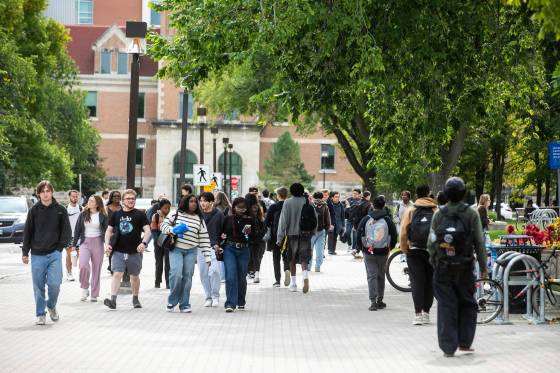|
What are Gen Z students thinking/worrying/anxious about?
We wanted to know, so we talked to some for today’s paper. We asked the same set of questions of current students at four of the city’s major post-secondary institutions (shout out to my student, Clara from U of M, who was a delight!)
Their answers are quite revealing. They have goals and plans. They have anxieties about not getting work after they graduate. They have criticism and insights about AI.
I was struck by how familiar and relatable their anxieties and worries were, even though ChatGPT was not even in the realm of imagination when I was a college kid. Smartphones, even, were a couple of years away.
But when I graduated from college in 2006 — you know, when this current crop of students were toddlers (skull emoji) — we were two years out from a crippling recession. Journalism had reached new levels of precarity back then; now, nearly 20 years on, even the new digital media upstarts have folded.

Students are back at campuses across the province. (Mikaela MacKenzie / Free Press)
But it wasn’t just journalism that saw precarity. Millennials saw the rise of the gig economy and patched together a living that way if they couldn’t find jobs, which was a lot of them. Adult milestones such as home ownership and having kids were delayed or deferred.
Now, Gen Z is graduating into the worst youth employment rate in decades. It’s the same in America, where recent grads told NBC News that they feel like it almost wasn’t worth going to school.
This might come as a surprise amid all the many think-pieces about the Gen Z Stare — the vacant expression The Youth use as a response to a question — and about how Gen Z doesn’t care about work.
The discourse around Gen Z actually reminds me a lot of trend pieces from just a few years ago when “Millennial” was treated as a synonym for “young person,” even though the eldest part of my cohort was entering their 40s. We supposedly killed a bunch of industries, including chain restaurants, diamonds and napkins. There was an entire financial-pundit-industrial complex built on the thesis that “maybe Millennials could afford houses if they didn’t buy so many avocado toasts and lattes!!!!!” People got paid real legal tender to say that on TV. In Millennial parlance: what a time to be alive.
I, too, have occasionally been grumpy about Gen Z, and not just because sometimes I think people are talking about me when they say “Gen Z.” First of all, they can be mean! And specifically, they are mean to Millennials: let us have our ankle socks and side parts in peace, we have to take a daily ibuprofen (or Vitamin I, as I call it) now, leave us alone. Also, we have earned the right to be “cringe.” We had to live through hipster irony.
Secondly, they are going viral on TikTok for Columbusing trends we had first. I’m just waiting for you all to start strapping WWE-championship-sized belts over your tunic T-shirts and rebranding it “beltcore.”
I have to resist the impulse to be like “hahaha it’s your turn,” when really I should know what that feels to be the subject of sweeping generational generalizations as a Millennial. We were once “lazy and entitled,” too. There will always, always, always be a brand-new cohort of “kids these days.”
Time will only tell what our collective beef with Gen Alpha will be, though I’ve already seen them be referred to, disparagingly, as iPad kids. (To be fair, it is wild to think about the fact that the members of Gen A aren’t just internet native, they are touchscreen native.)
Advertisement
 Why this ad? Why this ad?
Generational wars, as they are expressed in the media, are mostly pointless ragebait. But I think, at the root of them, is the very human desire to be seen. Everyone just wants their struggles to be acknowledged and respected as such. Back in my day we bootstrapped both ways uphill, etc.
Gen-wars are also shortsighted. I mean, why on earth would I make active enemies with the people who are going to be responsible for doing my hip replacements one day? When I am at the retirement castle ranting about memes and streaming television, I want these young ’uns to tell me I’m slay while they get me back to bed.
I want to have hope for the future and the hope is the children. They are full adults but you know what I mean. The students we talked to are driven, smart, thoughtful, and I was reminded, yet again, that if we just talk to each other, we might find we all have more in common than we think.
|

